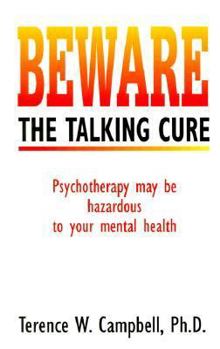Beware the Talking Cure: Psychotherapy May Be Hazardous to Your Mental Health
Family therapist Terence Campbell provides a much-needed critique of our therapy-happy society. He warns of the dangers that await the unwary, vulnerable client seeking answers for normal life... This description may be from another edition of this product.
Format:Paperback
Language:English
ISBN:0897771478
ISBN13:9780897771474
Release Date:January 1994
Publisher:Upton Books
Length:265 Pages
Weight:0.90 lbs.
Dimensions:0.7" x 5.4" x 8.5"
Customer Reviews
3 ratings
Unabashedly critical yet insightful
Published by Thriftbooks.com User , 20 years ago
Although this book considers many practitioners of therapy anathema, the author does enumerate thoughtful reasons as to why. It maginifies the possible harm humanistic/analytic/behavior indoctrination can cause. What's lacking is a comprehensive take on his therapy of choice. His crticisms of certain therapies should culminate into the final portions of his book, one that should exact a thorough depiction of his idea of beneficial therapy, one that should be so overwhelmingly insightful and seemingly obvious - inversely tantamount to his criticisms of pages earlier. You may ask why I appoint this book a 4. Well, it's immensely readable, peculiarly enjoyable, and instills you with a oscillating perception of whether or not the critique is true. I'm attracted to this book because its contentions are those that can be discussed, not thrown away.
Toward a balanced view of therapy
Published by Thriftbooks.com User , 24 years ago
I have been a student of mental health education at the pop, academic and professional levels continuously since about 1984. Initially I was a full-blown enthusiast of the field, believing that therapy and therapists could do no wrong, but as I have matured in the field I have pursued a balanced view. For example, I enjoy both the literature and tapes of Allen Frances, M.D., former DSM IV task force chair, as well as other authors from the American Psychiatric Press. But I also get a lot out of psych-bash books too. The truth about mental health beliefs, practice and practitioners is found only by looking at all sides of this fascinating field, even if it bores,hurts or angers. I certainly did not find a balanced picture in college, nor is it seen in the overwhelming majority of people who work in the mental health field today. Although somewhat irritating to read, and far from the most entertaining of books, I nevertheless found Terence Cambell's work to be important, and have read this and anotherof his. As this book points out, far too many therapists are troubled people providing junk "therapy" based on pseudo-science, folk myth, spiritualized pop philosophy, and pure guesswork. Instead of trying to cover up these and other problems or simply avoiding the issues, as is usually the case, the mental health field, from academics to clinical practice, needs to come clean and present the true, full, balanced picture, which is that of a field embraced by lifesaving wisdom and science, and artistically applied skill, as well as one where there is far too much hurtful nonsense and too many incompetent practitioners. All the bash books I have read have been written by field professionals and university academics, and not vengeful clients or opportunistic journalists. Among my favorite bash authors are Robyn Dawes, Elliot Valenstein, Bernie Zilbergeld, Paula Caplan, and Sidney Walker.
Informative and Insightful
Published by Thriftbooks.com User , 26 years ago
Campbell's book is a very thoughtful and useful summary of errors made by three of the major schools of psychotherapy--Psychodynamic, Behavioral and Humanistic. He clearly shows the dark side of these outdated practices, shows how evidence fails to support their theoretical framework and shows how unscurpulous and/or misguided therapists harm people with them. For this alone, the book deserves praise. There is a definate downside to this book, however. The author is an exremely enthusiastic supporter of Cognative Therapy and takes the opportunity to advertise for this school of thought while revealing none of its own down side. Cognative Therapy is, unfortunately, far from the panacea its adherants claim that it is. It ignores the reams of data demonstrating that many mental and behavioral for which one might seek therapy are actually brain disorders which are inhereted and shoud be treated with medication. Cognative Therapists note (correctly)that mentally ill people distort reality and go on to assume that if they could be trained to reason away the distortion, they would be cured. For instance, a depressed person think that everyone hates her so if she learned to understand that some people like her she would be better off. However, it is more likely that the cognative distortions are the RESULT of having a mental illness and not the CAUSE. When antidepressants are sucessful, for example, depressed people start to think that life might not be so bad after all, even though they have not made a conscious choice to change their philosophy of life. Critis of Cognative Therapy have pointed out that the "cognative distortion" happens simotaneously with mental illness and could not be the cause of it since a cause has to precede the effect. I definately recommend reading the book--just be as critical as the author's preconcieved ideas as he is of others.






